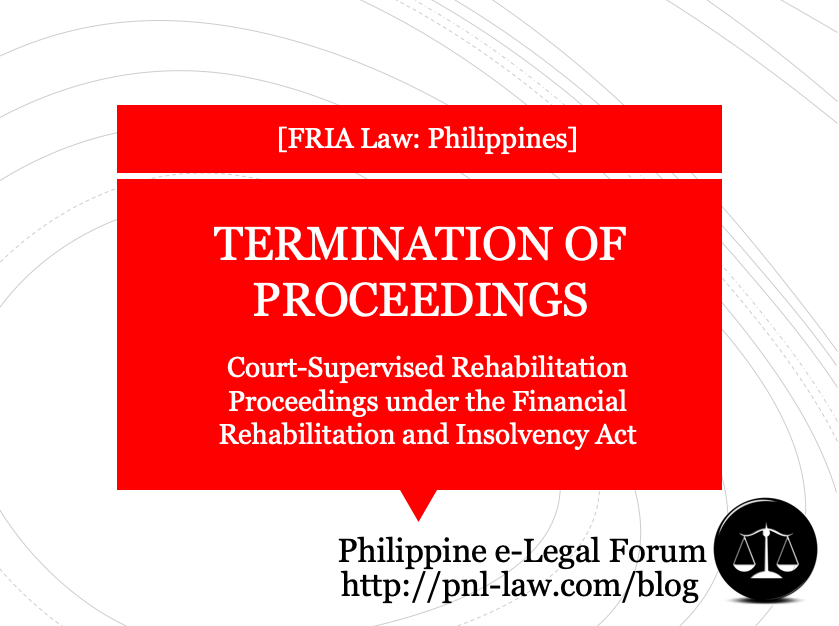Court-supervised rehabilitation proceedings filed pursuant to the “Financial Rehabilitation and Insolvency Act (FRIA) of 2010” (Republic Act No. 10142) shall, upon motion, be terminated by order of the court either: (a) declaring a successful implementation of the Rehabilitation Plan; or (b) a failure of rehabilitation.

TERMINATION OF PROCEEDINGS
At any time from the filing of the petition, any interested party or the rehabilitation receiver may file a motion for the termination of the proceedings. After hearing the motion, the court may order the proceedings terminated by either declaring a successful implementation of the Rehabilitation Plan or a failure of rehabilitation.
- 1. Dismissal of the petition by the court;
- 2. Failure to submit a Rehabilitation Plan;
- 3. A Rehabilitation Plan is not confirmed by the court;
- 4. Under the Rehabilitation Plan submitted by the debtor, there is no substantial likelihood that the debtor can be rehabilitated within a reasonable period;
- 5. The Rehabilitation Plan or its amendment is approved by the court but in the implementation thereof, the debtor fails to perform its obligations thereunder or there is a failure to realize the objectives, targets or goals set forth therein, including the timelines and conditions for the settlement of the obligations due to the creditors and other claimants;
- 6. Determination that the Rehabilitation Plan may no longer be implemented in accordance with its terms, conditions, restrictions, or assumptions;
- 7. There is a finding that fraud was committed in securing the approval of the Rehabilitation Plan or its amendment;
- 8. If, after finding merit in the objection/s raised against the confirmation of the Rehabilitation Plan, the defect is not cured within such time as the court may order, or if the court determines that the debtor acted in bad faith, or that it is not feasible to cure the defect; and
- 9. Failure of the debtor to comply with the Financial Rehabilitation Rules of Procedure (2013) or “FR Rules” (A.M. 12-12-11-SC), the Rules of Court, or any order of the court.
Upon a breach of, or upon a failure of the Rehabilitation Plan, the court, upon motion by an affected party, may:
- (1) issue an order directing that the breach be cured within a specified period of time, failing which the proceedings may be converted to a liquidation;
- (2) issue an order converting the proceedings to a liquidation;
- (3) allow the debtor or rehabilitation receiver to submit amendments to the Rehabilitation Plan, the approval of which shall be governed by the same requirements for the approval of a Rehabilitation Plan under this subchapter;
- (4) issue any other order to remedy the breach consistent with the present regulation, other applicable law and the best interests of the creditors; or
- (5) enforce the applicable provisions of the Rehabilitation Plan through a writ of execution.
EFFECTS OF TERMINATION
Termination of the proceedings shall result in the following:
- (a) The discharge of the rehabilitation receiver, subject to his submission of a final accounting; and
- (b) The lifting of the Stay Order and any other court order holding in abeyance any action for the enforcement of a claim against the debtor.
If the termination of proceedings is due to failure of rehabilitation or dismissal of the petition for reasons other than technical grounds, the proceedings shall be immediately converted to liquidation. [See Liquidation of Insolvent Juridical Debtors under the Financial Rehabilitation and Insolvency Act (FRIA) of 2010]
